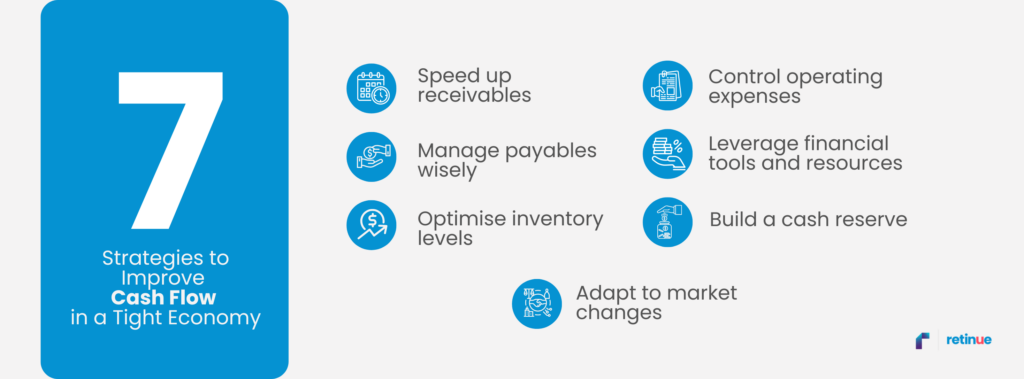
23 October 2024
In today’s uncertain economy, managing cash flow is more than a priority—it requires sharp foresight. With every dollar counting, businesses need smart, practical strategies to stay on solid ground. This guide will explore effective ways to boost your cash flow, helping your business thrive in tight economic times.
The Australian economy in 2024 faces several hurdles. High inflation and elevated interest rates are top of the list. These economic challenges result in rising costs, reduced consumer spending, and difficulties securing financing.
Cash flow management is no longer optional for businesses—it is a lifeline for survival.
Conduct a comprehensive cash flow analysis to assess your business’s current position. Review your bank statements and accounting records to track all cash inflows and outflows. Regular updates to this data will provide insights into your liquidity and overall financial health.
Identifying cash flow issues early is crucial. Monitor key metrics such as the average collection period and accounts receivable to sales ratio. Look for signs like frequent late payments or high operational expenses without corresponding revenue increases. Forecasting future cash flow by estimating sales and expenses helps you plan for shortfalls and take proactive measures.

1. Speed Up Receivables
Improve accounts receivable by streamlining your invoicing process. Implement electronic billing systems to reduce delays and offer incentives, such as discounts, for early payments. Stricter credit controls, like assessing the creditworthiness of new clients, can also reduce the risk of late payments and bad debts.
2. Manage Payables Wisely
Negotiating better payment terms with suppliers can improve cash flow. Aim to extend payment terms without incurring penalties and prioritise payments based on due dates and strategic importance. Automated systems can help track and manage payables, ensuring you avoid late fees and take advantage of early payment discounts.
3. Optimise Inventory Levels
Effective inventory management reduces holding costs and frees up cash. Consider implementing a just-in-time (JIT) inventory system to minimise excess stock. Use inventory management software to forecast demand and maintain optimal levels, preventing cash from being unnecessarily tied up in inventory.
4. Control Operating Expenses
Review all operating expenses and identify areas where costs can be cut without compromising business operations. This could include renegotiating contracts, reducing energy consumption, or automating routine tasks. Cost-saving measures such as remote work or outsourcing non-core functions can also help lower expenses and improve efficiency.
5. Leverage Financial Tools and Resources
Utilising financial technology can streamline your cash flow management. Tools like MYOB, Xero, and QuickBooks offer features for tracking expenses, invoicing clients, and reconciling bank statements in real time. Cash flow management tools like Pinch and Float provide automated invoicing and expense tracking. These tools reduce administrative burdens.
For businesses needing additional cash flow, consider financing options such as business loans, lines of credit, or invoice financing. Each option has pros and cons. Pick one that can offer a vital lifeline during financial crunches.
6. Build a Cash Reserve
A cash reserve acts as a buffer. They provide flexibility to handle unexpected expenses and seize growth opportunities. Start by setting a savings goal, typically three to six months’ operating expenses. Reinvest wisely and use financial tools to monitor progress. A robust cash reserve ensures your business can remain resilient during economic downturns.
7. Adapt to Market Changes
Flexibility and agility are key to navigating an uncertain economy. Consider diversifying revenue streams to reduce dependency on a single source of income. Scenario planning and proactive responses to economic changes can help maintain stability and drive growth, even in challenging times.
Consult a Professional for Guidance
Navigating cash flow challenges in a tight economy can be complex. Seeking advice from financial professionals ensures you have the right strategies tailored to your needs. They can provide insights into financial planning, tax optimisation, and cost management.
Call Retinue today on 1800 861 566 for support specific to your business needs. Let us navigate these uncertain times together!
*Retinue’s (ABN 66 658 618 449) payroll service includes the processing of hours and wages rates provided by you. We do not determine award rates for your employees or provide advice on the correct employment status of your employees. It is your responsibility to ensure that your employees are paid correctly and we recommend obtaining advice from specialised employment relations experts.
Protection is only provided for ATO investigations notified to us during the period which you are a client and relating to any tax returns or lodgements prepared by us. Fines includes any penalties and interest that may result from any errors made by us but does not include any additional tax liability that may result from an amended lodgement.
Liability limited by a scheme approved under Professional Standards Legislation.
©2024 Retinue. All rights.